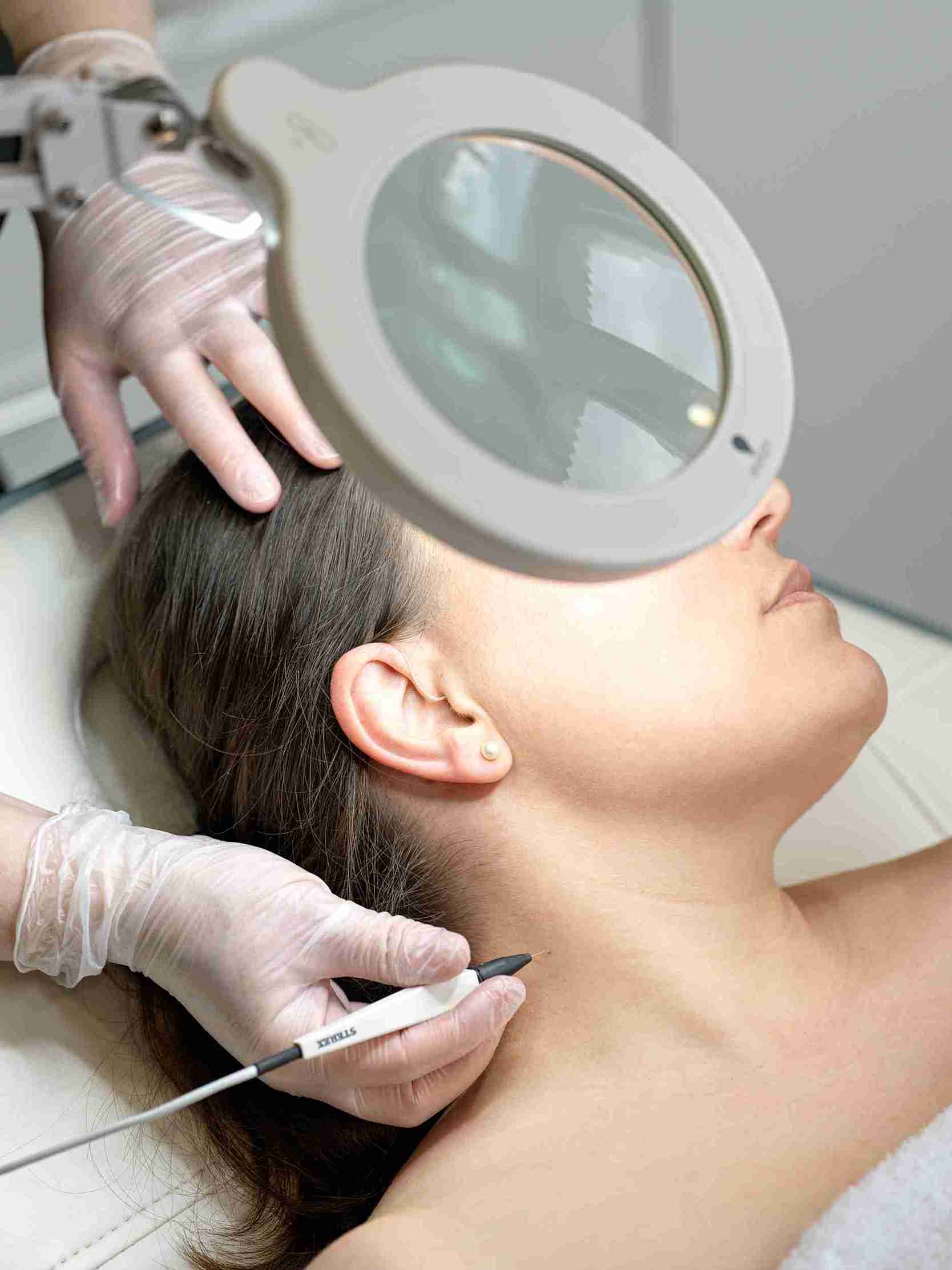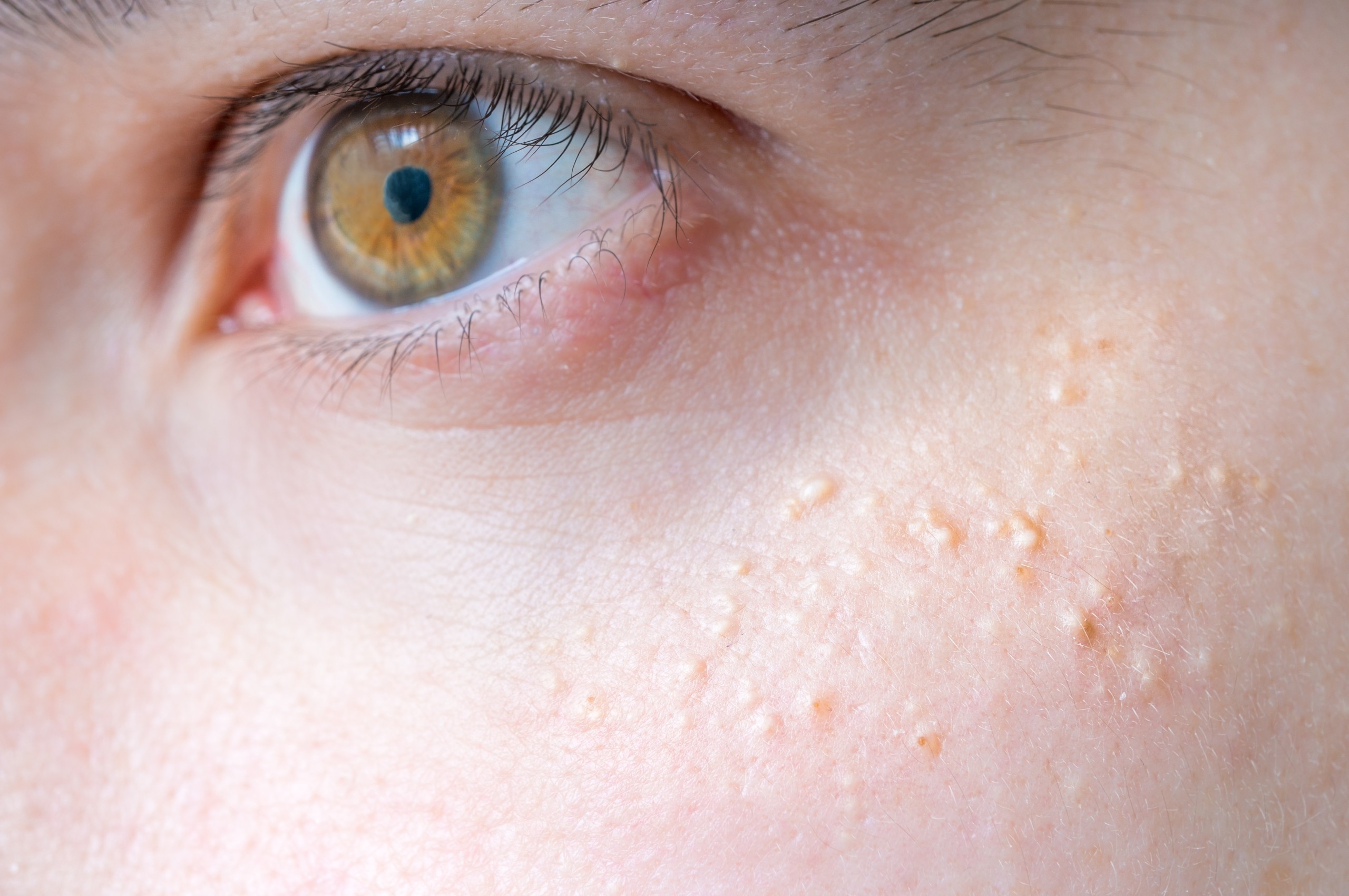What is Milia?
A milium cyst, sometimes called a “milk spot,” is a tiny, benign lump that can be yellow or white in colour. These cysts, known as milia, are frequently found in groups or clusters and are most frequently located on the nose, under the eyes, or around the cheekbone.
Milia may feel quite rough, almost like a tiny piece of grit under the skin, in contrast to a zit or spot. This is due to the fact that they are composed of hard, dead skin cells that are unable to decompose or escape beneath the skin’s surface.
Unlike whiteheads or spots related to acne, milium cysts do not exhibit any redness or inflammation. Although they are not harmful or infectious, some people may experience self-consciousness due to them, particularly if they are on a visible area of skin like the face.
Although mila can sometimes take a long time to go away on its own, it can be professionally treated with a quick, easy procedure. One of our specialists can walk you through the procedure when you schedule a consultation at our clinics in Kensington or Wimbledon.
What Treatments are Available for Milia?
Medical treatment for mila is not necessary as it is a common, benign, and harmless skin condition. Cosmetic treatments can, however, be used to target it if its appearance affects your confidence and self-esteem.
Advanced electrolysis is available at both our Wimbledon and Kensington clinics to effectively treat milium cysts. The treatment works by using an electric current and a very fine needle to cauterise a skin imperfection. Because the service is performed by hand, our therapists are able to treat precisely, even up to the lash line and across the eyelids.
Our experienced and highly trained practitioners will insert a sterilised and disposable probe into each lesion during a session whilst applying a variable current. This process creates a heating effect that causes its structure and content to coagulate or dry up when applied to a blemish. Occasionally, a microlance may also be used instead or in conjunction. Your practitioner will work carefully when treating your milia to ensure no healthy skin is affected.
After your treatment is complete, your skin begins its healing process. During this time, the treated lesion will crust over or form a scab, taking anywhere between 5-14 days to drop off. During this period, it is important that you do not pick or scratch any scabbing, as this will disrupt healing and potentially trigger hyperpigmentation.
Once a milium spot is completely removed, it will not reoccur. However, if an individual is more prone to developing milia, there is no guarantee that new ones will not form.
Advanced electrolysis is a relatively quick and straightforward treatment method. The procedure will cause no prolonged or residual pain. However, during treatment, you may experience a stinging sensation that can be mildly uncomfortable, but our professionals can talk you through how this can be managed. Once your session is complete, our practitioners will indicate whether further treatments are necessary; in cases with large coverage, multiple sessions may be required.
If you would like to improve the appearance of milia, please get in touch with us today. Here at Eden Skin Clinic, our specialists will expertly treat mild to severe cases of milium cysts at both our Central London clinics in Wimbledon and Kensington.
What Causes Milia?
A milium cyst is formed when keratin, a protein naturally produced by the body, becomes trapped in the skin’s surface layers, forming a tiny cyst. An individual milium is usually formed at the base of a hair follicle or sweat gland, where it is easier for dirt and debris to collect.
The reasons behind milia formation and why some individuals are more prone to them than others are largely unknown. Possible links have been discovered to high cholesterol levels, but this is currently unproven, though we know that some personal care factors can contribute.
As milia are formed from the trapping of dead skin cells, one of the foremost reasons for their occurrence is a lack of effective exfoliation. When the skin is not regularly exfoliated, dead skin cells and debris can build up on the skin’s surface and become lodged in pores, causing milia and other blemishes to appear. Some people may find that milium cysts occur more often as they age. This can be due to the fact that the speed of cell turnover slows as we mature, meaning that more frequent exfoliation is now required.
Another associated cause is the use of overly heavy products or over-application of product, particularly moisturisers, on the skin. This concern is commonly present around the eye area, where the skin is thinner, more delicate, and exfoliated less frequently. This area will struggle to absorb these heavier textures, thus causing the pores in the area to become clogged with excess product, occasionally forming milia.
For this reason, it is advisable for those prone to milia to use a cream specifically designed for the eye area rather than the same moisturiser used across the face, or if an eye cream is already used, to opt for a lighter, gel-like texture instead.
Milia Treatment Costs
If you are interested in our advanced electrolysis treatment to target milia, please get in touch with Eden Skin Clinic today. We would be happy to assess your skin concerns and work with you to create a bespoke treatment plan.
Please fill out our online consultation form if you are ready to get booked in for our treatments. We will get back to you shortly to schedule an appointment.
For more information about our prices, please view our prices in Kensington and Wimbledon respectively.
You may also call us at either of our central London clinics in Wimbledon or Kensington. Our expert team would be happy to answer your questions and help you find a treatment that suits your needs.






